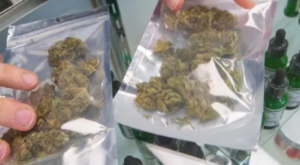When the Kansas House passed a medical marijuana bill in 2021, it was trumpeted as a historic event, the first time such a measure had been voted on in the state’s history and a move that would pave the way for the bill to finally pass in 2022.
A year has passed and relatively little progress has been made.
There is a window for the Legislature to create a medical marijuana program in some form, with members set to return to Topeka next week to wrap up their legislative business.
But lawmakers will have a host of other big-ticket items — including tax cuts, sports betting and bills on public health — on the agenda as well, meaning that window is beginning to close shut.
The Kansas Senate formally introduced its own version of the medical marijuana bill in March but there appears to be muted enthusiasm for the idea in the chamber, with the legislation yet to move out of committee.
Senate President Ty Masterson, R-Andover, said in mid-March he believed it was a “mature” issue and one where his chamber needed to weigh in.
But in a follow up interview two weeks later, he said the Senate had established its position when it approved a separate piece of legislation, allowing certain approved medications including cannabis to fall underthe state’s definitin of marijuana. 
“There’s just been zero interest in that bill on this side as a whole,” Masterson said of the broader medical marijuana bill. “I’ve not spent a lot of time looking through it.”
Others are keeping hope alive. Sen. Rob Olson, R-Olathe, chair of the Federal and State Affairs Committee, the committee reviewing cannabis policy, said passage was still “doable,” despite the dwindling days of the legislative session.
“I’m holding out hope there is an opportunity to get it done,” he said. “I don’t know if there is yet. But I’d never say never.”
In January, Senate leadership referred the House version of the bill to a little-used committee and instead tasked Olson with coming up with a different piece of legislation — thought the Senate and House versions are largely similar.
Both, for instance, restrict cannabis sales to oils, patches, edibles and similar products, with the smoking of marijuana still banned.
It is similar to how other states, most notably Ohio, launched their own programs, though most have since allowed for the sale of smokable products.
Medical marijuana advocates have long believed the same would be true in Kansas, believing the Legislature would likely bow to consumer demand in expanding allowable offerings, despite pledges from hesitant Republicans.
“These guys want to just be able to hit a vape pen a couple of times and go back to work,” Jack Mitchell, a Kansas City, Mo. attorney who owns several dispensaries in Kansas’ eastern neighbor, said during a legislative hearing last month.
Individuals with a limited set of conditions would be eligible, including cancer, multiple sclerosis and epilepsy. The Senate version would add “debilitating psychiatric disorders” to that list.
And advertising restrictions would be largely similar between the two bills, preventing retailers from prominently promoting their wares and preventing dispensaries from generally being located near a church, school or library.
The main differences between the plans include the Senate version requiring dispensaries to implement more security measures in order to guard against theft. Those include exterior lighting, video monitoring and hiring a security manager.
And the two plans differ greatly in their fee structure, with some payments in the Senate bill for growers, processor and dispensaries over twice as high as in the House counterpart.
For growers, the two-year fee to obtain or renew a license would be $20,000, with an additional $4,000 per 100 square foot licensing fee. A processor, meanwhile, would pay a $180,000 licensing fee every other year.
This led to worries that the structure would push out Kansas farmers and companies, instead allowing only larger, national firms to do business in the state.
“It does just open up the market to only those corporate, out-of-state interests,” Heather Steppe, president of the Kansas Cannabis Chamber of Commerce, said during the hearing. ” … We need to have a program that is able to support small businesses and family farmers out in western Kansas just as much as it is for industrial and large operations in our Wichita and Kansas City areas.”
Olson said he would be talking next week with his counterpart in the House, Rep. John Barker, R-Abilene, about how to potentially rectify differences between the bills.
But skeptics remain in the Senate. Sen. Mark Steffen, R-Hutchinson, said during a legislative forum earlier this month he preferred House Bill 2262, the one cited by Masterson that would allow for the prescription of pills containing active THC, as long as they are otherwise approved by the Food and Drug Administration.
“We need to be very, very careful moving forward,” Steffen said.
The FDA has approved two medications containing THC, the active ingredient found in marijuana. The two drugs — dronabinol and nabilone — are authorized primarily for those undergoing chemotherapy or who have wasting syndrome due to AIDS.
Still, advocates believe now is the time for Kansas to move forward with a full-fledged medical marijuana plan.
The state remains one of 38 without a medical marijuana program and one of only three without a public cannabis access program.
If Kansas waits until the drug is decriminalized nationally or some sort of national model for medicinal use is approved, those in favor of legalization argue the state would inherently be disadvantaged when compared with competitors in Colorado or Oklahoma, who have had cannabis for years.
The U.S. House passed a bill earlier this month to decriminalize marijuana nationally, though it remains unlikely to move in the U.S. Senate.
“It is here,” Steppe said. “Let’s regulate it and let’s get this going.”
Those hoping for medical marijuana will likely need to be patient. If a bill does happen, it will likely be the last thing legislators do before breaking for the year.
Olson said it is possible the matter could even be taken up on the ceremonial final day of session.
“If we did it, it’ll be the last bill out of the building,” he said.
As reported in the Topeka Capital Journal.




